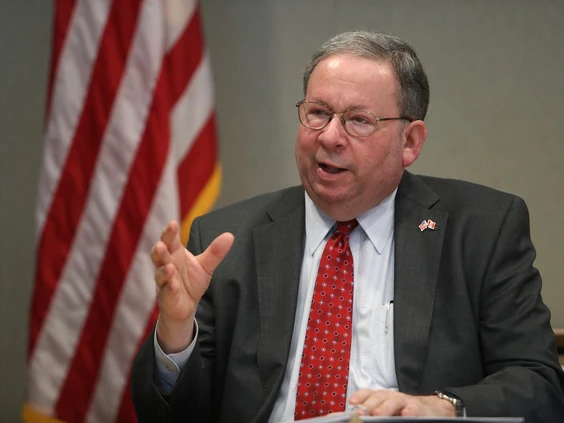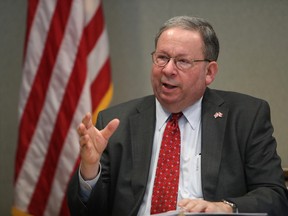
Premier David Eby took a trip up to Whistler on Monday to speak to U.S. Ambassador David Cohen and lobby for the lifting of tariffs on Canadian softwood lumber imports, while also being careful to avoid contentious discussions around the current state of political discourse south of the border.
In February, the U.S. Department of Commerce announced it would be raising tariffs on Canadian softwood lumber from 8.05 per cent to 13.86 per cent.
Article content
“He agreed to take back the topic to his trade people, and he did note it would not be the first time that he had asked them to have a look at it,” Eby told Postmedia following the meeting.
“But we’re coming up into setting new tariffs again on Canadian lumber producers, and the sector’s already under significant pressure due to record-low lumber prices. My hope was that his team could have a look at it and address the balance in our trade account.”
The premier said the pair also discussed ways the province can work with the U.S. to leverage the 2026 FIFA World Cup for economic benefit, ongoing negotiations on a modernized Columbia River Treaty, and the possibility of grape growers in the U.S. partnering with B.C. wineries decimated by an abnormally cold winter.
Eby said the World Cup appeared to be a top priority for Cohen, with the ambassador pointing to last year’s FIFA Women’s World Cup in Sydney, Australia, as a model for how 2026 can be an economic boon for both Canada and the U.S.
The tournament in Australia generated $1.32 billion in economic benefits for that country’s economy.
Breadcrumb Trail Links
David Eby talks lumber tariffs with U.S. ambassador, avoids (mostly) wading into American politics
Eby and David Cohen also discussed the 2026 FIFA World Cup, ongoing negotiations on a modernized Columbia River Treaty and the possibility of American grape growers partnering with B.C. wineries
Author of the article:
Published Jul 22, 2024 • 3 minute read

David Cohen, the U.S. Ambassador to Canada. Photo by David Kawai /The Canadian Press
Article content
Premier David Eby took a trip up to Whistler on Monday to speak to U.S. Ambassador David Cohen and lobby for the lifting of tariffs on Canadian softwood lumber imports, while also being careful to avoid contentious discussions around the current state of political discourse south of the border.
In February, the U.S. Department of Commerce announced it would be raising tariffs on Canadian softwood lumber from 8.05 per cent to 13.86 per cent.
Article content
“He agreed to take back the topic to his trade people, and he did note it would not be the first time that he had asked them to have a look at it,” Eby told Postmedia following the meeting.
“But we’re coming up into setting new tariffs again on Canadian lumber producers, and the sector’s already under significant pressure due to record-low lumber prices. My hope was that his team could have a look at it and address the balance in our trade account.”
The premier said the pair also discussed ways the province can work with the U.S. to leverage the 2026 FIFA World Cup for economic benefit, ongoing negotiations on a modernized Columbia River Treaty, and the possibility of grape growers in the U.S. partnering with B.C. wineries decimated by an abnormally cold winter.
Eby said the World Cup appeared to be a top priority for Cohen, with the ambassador pointing to last year’s FIFA Women’s World Cup in Sydney, Australia, as a model for how 2026 can be an economic boon for both Canada and the U.S.
The tournament in Australia generated $1.32 billion in economic benefits for that country’s economy.
Sunrise
Start your day with a roundup of B.C.-focused news and opinion.
By signing up you consent to receive the above newsletter from Postmedia Network Inc.
Article content
Article content
One idea, said Eby, is for the province to be a partner with Amtrak on upgrades the rail company has planned for its Cascades line from Oregon to Vancouver.
“There’s an opportunity for British Columbia to potentially work with them to ensure that they’re able to use some of their newer trains on that corridor, which enables them to work more efficiently and move people between our two countries more effectively.”

B.C. Premier David Eby was in Halifax last week Photo by Darren Calabrese /The Canadian Press
Eby also took time Monday to address the Pacific NorthWest Economic Region annual forum, which was being held in Whistler.
He told reporters at an unrelated news conference that the goal of his address was to strengthen relationships with cross-border partners in Washington, Oregon, California, Idaho, Montana and Alaska, and ensure that B.C.’s trade relationship with the U.S. remains in place regardless of the outcome of this November’s American election.
While Eby did make a veiled critique of Donald Trump and the Republican Party for suggesting “we’re better off if we isolate certain groups to tell people they’re not welcome,” he mostly stayed away from voicing his opinion on U.S. politics.
Article content
He said the province’s trade relationship with the U.S. is too important to let political differences get in the way.
“Regardless of political perspective or party, we benefit greatly from the close relationship we have with the United States, and they benefit greatly from the close relationships they have with us.”
To this end, Eby’s speech to dignitaries focused primarily on opportunities for private investment in B.C.’s clean energy future, whether that be in clean hydrogen projects or critical mining operations.
He said climate change not only creates challenges, but also new opportunities for collaboration and economic development.
“Our big economic advantage in British Columbia is the ability to use our hydro electricity to produce low-carbon resources,” he said. “As your federal government in the United States looks at potential tariffs related to carbon intensity, as the European Union looks at the same thing, that could potentially be a very significant export opportunity for us here in British Columbia.”